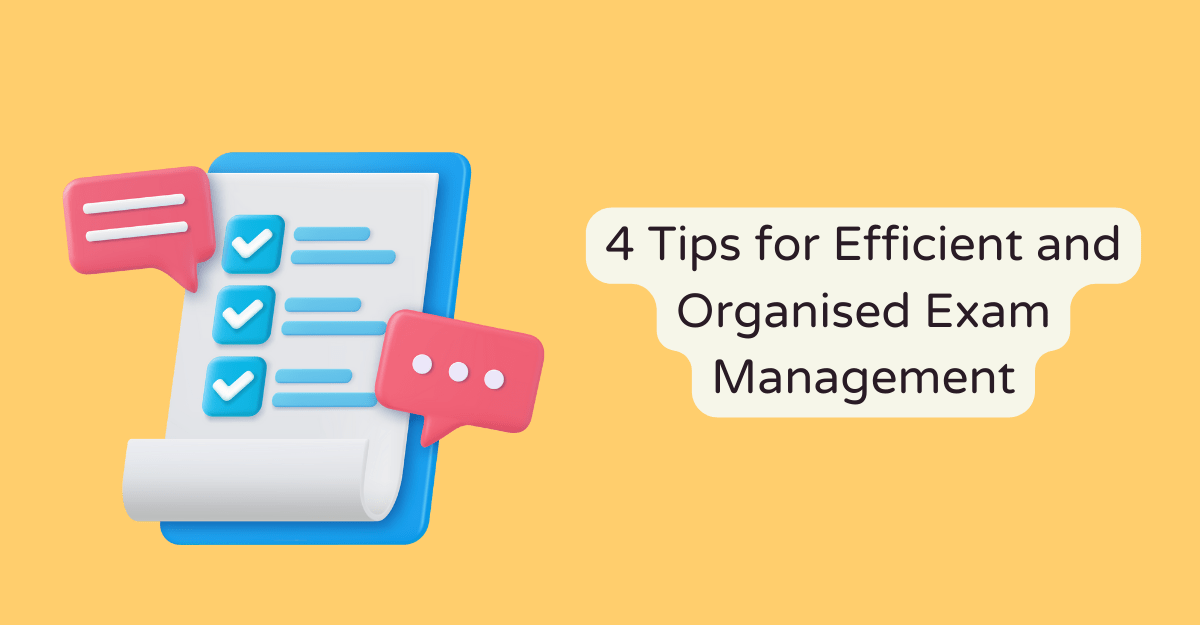
Tips for Efficient and Organised Exam Management
Exams – the word alone can evoke anxiety or anticipation in the hearts of students and professionals alike. For educational institutions and businesses, the process of crafting, administering, and grading exams has traditionally been a complex, time-consuming process that leaves many stakeholders feeling overwhelmed. With the advent of digital tools and an increased focus on efficiency, however, there are new strategies available that can streamline this important process.
In this article, we will explore four actionable tips that can revolutionise how you manage your exams, ensuring a smooth, organised operation that enhances the experience for all involved.
Tip 1: Tailor your Examination Strategy
One size does not fit all, especially in the realm of exams. Customisation is key to an effective examination strategy. When crafting examinations, consider the unique needs, strengths, and learning objectives of your students or employees.
Understanding Your Candidates
Begin by understanding the demographics and backgrounds of those taking the exams. Tailoring questions and formats to resonate with their experiences and knowledge levels can significantly boost engagement and performance.
For example, younger test-takers might benefit from a more interactive, digital format, while older candidates may respond better to traditional written tests.
Smarter Testing Formats
Explore various testing formats beyond the conventional multiple-choice questions. Consider incorporating virtual simulations, open-ended questions, or practical exercises when applicable. This not only provides a more complete assessment but also can reduce the potential for cheating or the need for elaborate monitoring.
Continuous Adaptation
Be prepared to adjust your examination methods based on feedback and outcomes. Continuous adaptation ensures that your examination process remains dynamic and relevant, aligning with the evolving needs of your learners.
Tip 2: Leverage Technology for Streamlining
Technology is a powerful ally when it comes to simplifying exam management. Digital tools can automate processes, reduce human error, and provide deeper insights into the testing process.
Digital Examination Platforms
Utilise digital platforms for exam creation and administration. These platforms often come with features like question randomisation, automated scoring, and the ability to schedule and monitor tests in real-time. Not only do they save time, but they can also enhance the security and integrity of the examination experience.
Data Analysis
After the exams, analyse the data collected by technology to identify trends, knowledge gaps, and areas for improvement. This analytical approach can inform curriculum changes and instructional strategies, ensuring your educational or training programme remains effective.
Engaging Feedback Loops
Integrate feedback mechanisms within your digital exams. This can be in the form of post-exam surveys or real-time interactive questionnaires that can provide immediate insights for future enhancements.
Tip 3: Implement Robust Exam Administration Practices
Effective administration is the backbone of successful exams. Implementing solid and effective practices is essential for managing logistics.
Clear Communication
From the start, ensure that all stakeholders are well-informed on the exam details, including dates, times, and expectations. Clear communication can prevent misunderstandings and reduce stress for both the administrators and the test-takers.
Seamless Scheduling
Use scheduling tools to arrange exams that maximise convenience and efficiency. Consider the best times to avoid clashing with other events or exams to prevent burnout and facilitate a smooth transition.
Proactive Troubleshooting
Anticipate issues and have a plan in place for swift resolution. This could involve having backup systems ready for technical difficulties or ensuring there are enough staff members to address any unforeseen problems that may arise onsite.
Tip 4: Stay Agile with Outsourcing Opportunities
In an increasingly interconnected world, consider looking beyond your in-house resources to manage exams more effectively.
The Outsourcing Advantage
When you outsource exam management to professional organisations, you can alleviate the burden on your internal team, particularly during peak exam periods. These specialists often have the expertise and resources to manage complex testing processes efficiently.
Cost and Time Benefits
Outsourcing can also be cost-effective, as it eliminates the need for significant investments in technology and staff training. It also frees up your team to focus on core educational or business activities.
Choosing the Right Partners
When considering outsourcing, choose partners with a proven track record and a commitment to excellence and integrity. Be clear about your requirements and expectations, and establish a strong working relationship for a successful collaboration.
In Summary
By implementing these tips, you can modernise your exam management process, fostering an environment that supports learning and professional growth. Remember, it’s not just about managing exams – it’s about creating an experience that mirrors the value and potential of the education or training being given.






